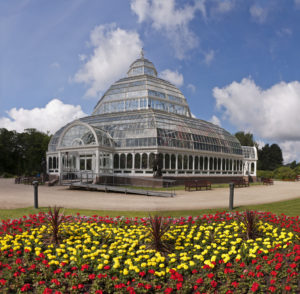Participating in an awareness day
Reaching out to a wide range of partners proved a natural way to devise a public event to raise awareness of dementia research and support, with something for everyone. Coordinated by the National Institute for Health Research (NIHR)’s North West Coast Clinical Research Network (NW CRN), a Dementia Showcase event open to the public brought support organisations together, provided a vision of how dementia patients can participate in life-enhancing activities, and included information about research.
In 2019, Laura Dawson, Portfolio Research Facilitator, and Sarah Dyas, Research Delivery Manager, and colleagues at the NW CRN set out to arrange the Showcase event in Liverpool.
It followed extensive scoping work done by Dr Grahame Smith of Liverpool John Moores University, the Network’s Research Specialty Lead on Dementia, which identified the many organisations and partners who were working to support dementia patients and their carers in the region. It had become evident that much of the valuable and worthwhile work was being done in isolation, so the team wanted an event that would bring the organisations together to promote more collaborative working, as well as highlighting sources of help and advice.
Support was provided for the event by Lancashire Teaching Hospitals Trust and by many other local Trusts, and the first step was to send mailshots to all the NIHR’s regional partners to get the word out and to request participation. This included not only Trust partners but wider stakeholders including primary care and social care settings.
Range of activities

The Palm House in Sefton Park Liverpool, where the event was held.
The NW CRN team decided on Liverpool’s Sefton Park Palm House as the event venue, partly since it had a track record of lending its space to dementia services, and partly as the Victorian glasshouse would provide an exciting and colourful setting. The Palm House has its own publication and mailing list, so the venue team were able to help by advertising the Dementia Showcase in the lead up to the day. Targeted adverts also went to contacts in Age UK and dementia respite services.
On the day, well over a hundred people turned up, helped by radio coverage of the day on BBC Radio Merseyside. Attendees could explore over 17 stands offering different services and information and get involved in a range of activities.
Several stands featured information about managing dementia conditions, as well as accessing hospital-based dementia services. There was news from specific study teams and research projects, including Join Dementia Research, which had a stand to inform people about the service.
But the event featured many other activities that patients could get involved in. Dementia choir, The Memory Singers gave performances of wartime favourites, with information about how singing can activate a different part of the brain. Singing provides an important element of therapy for choir members, who might be unwilling to speak in normal life yet enjoy singing in company. Exercise group Healthiness Ltd demonstrated Active Bingo, where participating in different movements let them fill up a card and win a prize. Other activities involved a walking tour of the Palm House, hand massages and trying out alternative therapies.
Enjoying life to the full
Sarah Dyas remembers: “There was such positive energy in the Palm House, both from staff networking together and patients and their carers being involved in the activities. It was a very enjoyable and interactive event and evaluated very well.”
The day was successful in generating signups for individual research studies, as well as for Join Dementia Research. More followed when the event was covered by Liverpool Bay TV and Radio City. The majority of the signups were from patients already living with dementia, rather than healthy volunteers, something the research teams found very beneficial.
Laura Dawson explained: “I think the event was effective because we didn’t just bombard people with information about clinical studies, but presented them as part of a whole range of things that are on offer. We thought hard about what attendees wanted as their outcome from the event; it’s generally to continue to enjoy life to the full, and hopefully part of that involves learning about research and getting involved.”
Lessons learned:
- Choose a beautiful setting if you can – it will make the day special and avoid a purely clinical focus.
- Think hard about what the people coming can get out of the day, not just what you want from them
- A good mix of clinical and holistic activities can help to give it a cohesive feel and make it more of a ‘destination’ event.
- Media coverage can help build anticipation before the event, convey the ambience during the event, and even prolong the effect of the event after it’s finished. Local radio will obviously need a range of interesting people to speak to and something like a choir really helps.
